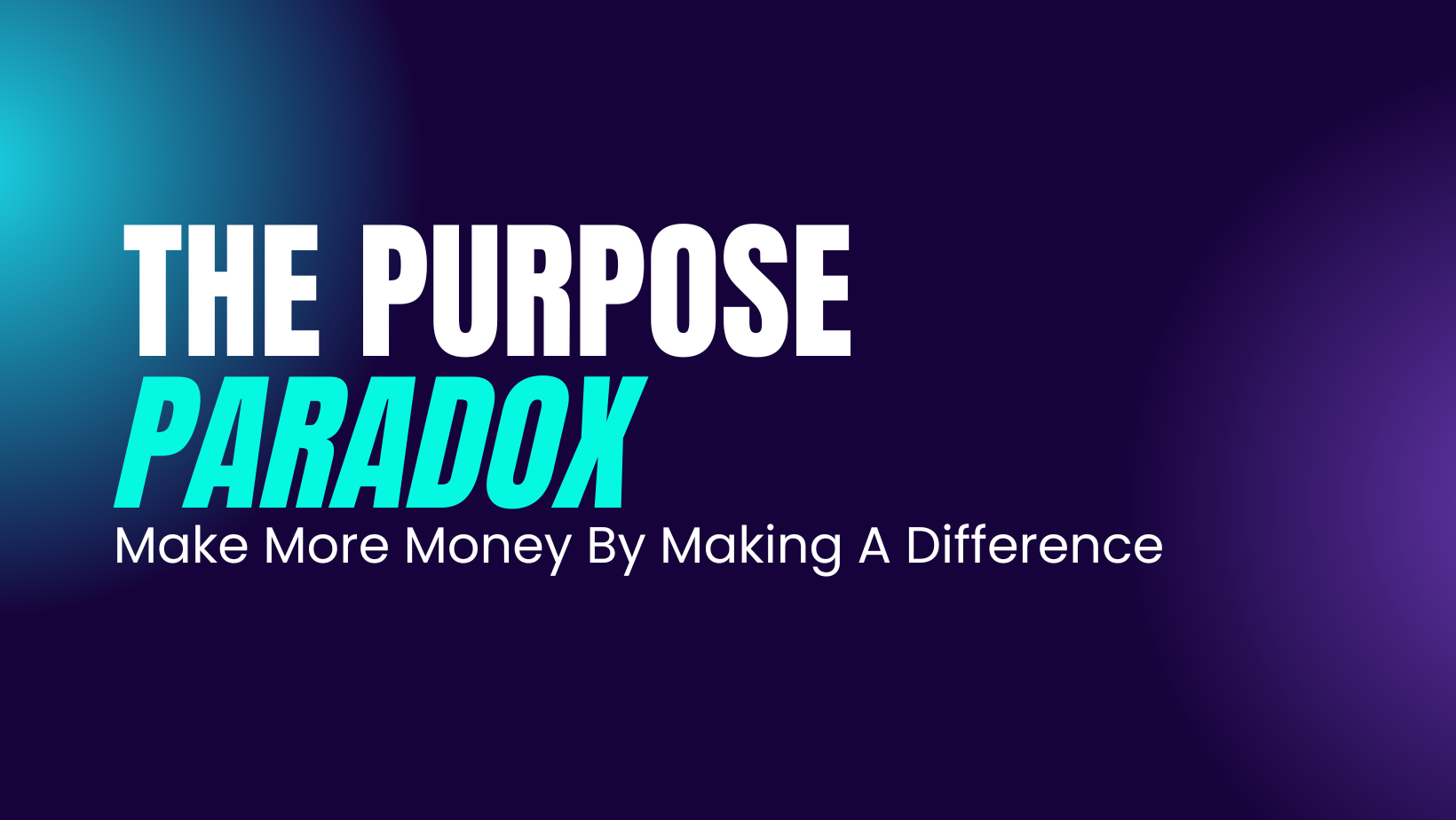The Purpose Paradox: Make More Money By Making A Difference
When it comes to achieving success, many organizations still believe that doing good and making money are mutually exclusive. But the Purpose Paradox challenges this outdated notion by demonstrating that focusing on purpose can actually drive financial success. Purpose-driven organizations—whether businesses, churches, or nonprofits—are proving that aligning their operations with a meaningful mission leads to sustainable growth.
Why the Purpose Paradox is a Paradox
The Purpose Paradox is intriguing because it goes against traditional business thinking, which prioritizes short-term profits and shareholder returns. This mindset often leads to decisions that maximize immediate earnings but can damage reputation and long-term success. However, purpose-driven organizations are flipping the script, showing that when you prioritize initiatives for social, spiritual, economical, or environmental impact, you not only do good but also perform better financially, increasing the bottom line.
A Harvard Business Review study found that companies with strong environmental, social, and governance (ESG) practices tend to outperform their peers. This paradox arises because purpose-driven organizations focus on building strong relationships with all stakeholders, including employees, customers, congregants, and donors, rather than just focusing on profits.
The Power of Purpose-Driven Engagement
Engagement is a critical factor in the success of purpose-driven organizations. By clearly articulating and living out their mission, these organizations attract and retain people who share their values. This includes employees who are more motivated and productive, clients who are more loyal, and donors and congregants who are more committed to supporting the cause.
For example, a Deloitte survey highlighted that millennials and Gen Z prefer to work for and support organizations that prioritize purpose and social impact. This trend demonstrates how a clear mission can drive engagement across all sectors, whether you’re leading a business, church, or nonprofit.
Building Loyalty Through Mission Alignment
Consumers and supporters today want to engage with organizations that reflect their values. According to Accenture, 63% of consumers choose to purchase from companies that align with their personal beliefs. Purpose-driven organizations capitalize on this by aligning their operations with their mission, which in turn builds trust and loyalty.
Consider TOMS and their one-for-one model, which directly connects product sales with social impact. This clear alignment not only attracts customers but also fosters a community of individuals who feel invested in the company’s mission. Similarly, a church that actively engages in community service can see increased attendance and support from congregants who value making a tangible impact.
The Purpose Paradox Framework: Define, Align, Amplify, Measure
To fully embrace the Purpose Paradox, organizations should adopt the following framework:
- Define Your Purpose: Clearly articulate what your organization stands for and what impact you aim to achieve. This purpose should guide every action and decision. For instance, Patagonia’s mission to “build the best product, cause no unnecessary harm, and use business to inspire and implement solutions to the environmental crisis” is a prime example of a clear and inspiring purpose.
- Align Your Operations: Ensure that every aspect of your organization reflects your mission. From hiring practices to product development and community outreach, everything should be aligned with your core values. TOMS exemplifies this through its business model, where sales directly translate into social impact.
- Amplify Your Story: Share your journey with transparency and authenticity. Engage your stakeholders—clients, donors, congregants, and the wider community—by being open about your progress and challenges. Seventh Generation, committed to sustainability, publishes an annual report detailing their progress towards environmental goals, demonstrating accountability.
- Measure Your Impact: Identify key metrics that align with your purpose and track your progress. This demonstrates accountability and commitment to your mission. Warby Parker tracks their impact by measuring the number of people who gain access to affordable eyewear, reinforcing their dedication to social good.
Integrating Purpose Across All Sectors
Regardless of whether you’re running a business, a church, or a nonprofit, integrating purpose into every aspect of your operations is essential for success.
- Businesses: Align product lines and corporate social responsibility (CSR) initiatives with your mission. A business focusing on sustainability can attract customers who value environmental responsibility, enhancing both sales and impact.
- Churches: Engage congregants by aligning your sermons, community programs, and outreach efforts with your core mission. This alignment fosters a sense of belonging and purpose, encouraging regular attendance and financial support.
- Nonprofits: Attract and appeal to more donors by clearly articulating your mission and demonstrating the tangible impact of your work. By sharing success stories and impact metrics, you build trust and inspire continued support from existing donors while attracting new ones.
Conclusion: Embrace the Purpose Paradox
The Purpose Paradox demonstrates that doing good and achieving financial success are not mutually exclusive. Purpose-driven organizations that embrace this paradox are more likely to achieve sustainable and authentic growth. By defining their purpose, aligning their operations, amplifying their story, and measuring their impact, they can make a meaningful difference in the world and succeed financially.
If you’re ready to harness the power of the Purpose Paradox, start by defining your organization’s unique purpose and aligning your operations to reflect your mission. Whether you’re a business, church, or nonprofit, the path to financial success and meaningful impact begins with purpose. Connect with us at HOLY SH*FT! Creative Studio to discover how we can support your journey towards purposeful growth.

